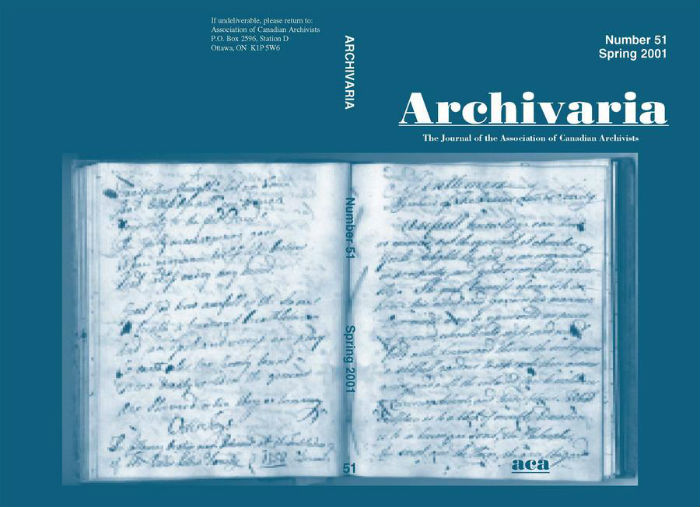The Past That Archives Keep: Memory, History, and the Preservation of Archival Records
Abstract
Does “the past” take on different meanings in the contexts of history and memory? Does the answer to this question have any bearing on archives? This article answers affirmatively to both these questions. Its main argument is that ascribing a distinctive meaning to “the past” in the framework of memory enables the development of a perspective on archival work that enhances the value of old records to contemporary organizations and society. The argument unfolds over the course of three sections. The first section argues that certain elements of the Australians’ records continuum are more compatible with the idea of societal and organizational memory than the records life cycle, and further, that, on an archival reading, the records continuum is a more coherent temporal concept than the records life cycle. The second section draws on research from several disciplines to argue that, within the framework of memory, alluding to the past simply represents another way of talking about the present. The third section deploys ideas from the first two sections to propose ten conceptual, organizational, and technological issues that deserve attention with respect to long-term records preservation programmes.
RÉSUMÉ
Est-ce que « le passé » prend des sens différents dans les contextes de l’histoire et de la mémoire? Est-ce que la réponse à cette question a une relation avec les archives? Cet article répond par l’affirmative à ces deux questions. Son argument principal est que d’attribuer un sens distinct au « passé » dans le cadre de la mémoire permet le développement d’une perspective sur le travail archivistique qui rehausse la valeur des documents anciens pour les organisations et la société contemporaines. Le raisonnement de l’auteur se dévoile en trois sections. La première veut démontrer que certains éléments du concept australien de continuum des documents sont plus compatibles avec l’idée de la mémoire sociale et organisationnelle que ne l’est celui du cycle de vie des documents et que de plus, sur un plan archivistique, le continuum des documents est un concept plus cohérent au point de vue temporel que le cycle de vie des documents. La deuxième section se base sur des recherches de différentes disciplines pour démontrer que, dans le cadre de la mémoire, faire référence au passé représente simplement une autre façon de parler du présent. La troisième section se fonde sur les idées des deux premières pour proposer dix questions d’ordre conceptuel, organisationnel et technologique qui requièrent l’attention en ce qui concerne les programmes de conservation à long terme des documents d’archives.
Authors of manuscripts accepted for publication retain copyright in their work. They are required to sign the Agreement on Authors' Rights and Responsibilities that permits Archivaria to publish and disseminate the work in print and electronically. In the same agreement, authors are required to confirm that "the material submitted for publication in Archivaria, both in its paper and electronic versions, including reproductions of other works (e.g. photographs, maps, etc.) does not infringe upon any existing copyright." Authors of manuscripts accepted for publication retain copyright in their work and are able to publish their articles in institutional repositories or elsewhere as long as the piece is posted after its original appearance on archivaria.ca. Any reproduction within one year following the date of this agreement requires the permission of the General Editor.





